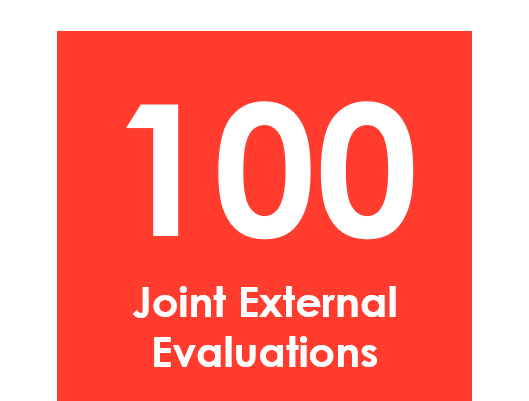
100 Joint External Evaluations – an Important Public Health Milestone
July 5, 2019
Dear Colleagues,
On July 5th, 100 Joint External Evaluations (JEEs) will be completed. This reflects 100 countries from all WHO regions having volunteered to implement the evaluation in little over 3 years. This achievement represents an important milestone and highlights remarkable multisectoral engagement, investment, and collaboration, which would not have been possible without the commitment of our Member States, sister organizations, as well as international partners.
The collaboration has enabled multi-year success in conducting these evaluations, reinforcing the principles of transparency and mutual accountability, while strengthening global efforts to prevent, detect, and rapidly respond to public health threats.
Since the launch of the first JEE in Tanzania in February 2016, WHO has published an updated, more powerful JEE Tool, standardized implementation guidance materials, while simultaneously identifying solutions to implementation challenges, and recommending strategies to facilitate future JEEs. The JEEs have also supported the States Parties Annual Reporting (SPAR) process and recent analysis has shown how the findings of each are aligned with each other.
Incredible insights into the technical capacities of countries and regions have been made possible through this process. As a result, the findings and recommendations from the JEEs have facilitated the development of National Action Plan for Health Security (NAPHS), and assisted country leadership and stakeholders to identify priority gaps, determine critical actions, and launch efforts to improve preparedness levels, and emergency management and response to public health threats.
JEE implementation is ongoing, with 20 additional evaluations scheduled in 2019 and beyond. Simultaneously, the methodology for the second round of JEEs is in development, as well as guidance for special context countries to implement the tool and process to meet their unique challenges. The JEE findings will continue to link to the IHR Monitoring and Evaluation Framework components to provide a comprehensive, multi-dimensional, and longitudinal understanding of a country’s gaps and critical actions. JEEs will also continue to support the broader efforts needed to better mobilise resources and investments in preparedness.
Congratulations to you and your teams for our collective success. At WHO, we are thankful for your dedicated commitment and support, and we look forward to our continued collaboration.
Dr Jaouad Mahjour | Assistant Director-General | Emergency Preparedness and International Health Regulations | World Health Organization | Email: mahjourj@who.int | Tel: +41227914571
Videos
.column { float: left; width: 33%; padding: 2px; } /* Clear floats after the columns */ .row:after { content: ""; display: table; clear: both; }